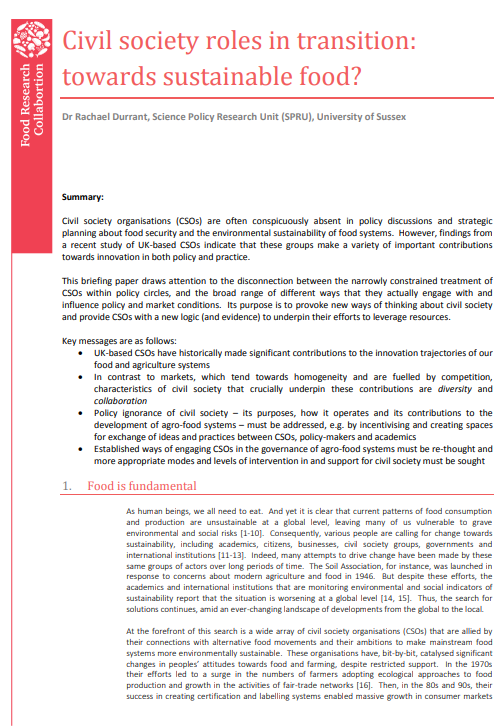Civil society organisations (CSOs) are often conspicuously absent in policy discussions and strategic planning about food security and the environmental sustainability of food systems. However, findings from a recent study of UK-based CSOs indicate that these groups make a variety of important contributions towards innovation in both policy and practice.
This briefing paper, written by Dr Rachael Durrant from the Science Policy Research Unit (SPRU) at the University of Sussex, draws attention to the disconnection between the narrowly constrained treatment of CSOs within policy circles, and the broad range of different ways that they actually engage with and influence policy and market conditions. Its purpose is to provoke new ways of thinking about civil society and provide CSOs with a new logic (and evidence) to underpin their efforts to leverage resources. The development of this paper was supported by the following project steering team members: Sue Dibb, Eating Better; Dr Rob Macmillan, Third Sector Research Centre, University of Birmingham; Ben Reynolds, Sustain; and Hannah Brinsden, World Obesity Federation
Key messages are as follows:
· UK-based CSOs have historically made significant contributions to the innovation trajectories of our food and agriculture systems
· In contrast to markets, which tend towards homogeneity and are fuelled by competition, characteristics of civil society that crucially underpin these contributions are diversity and collaboration
· Policy ignorance of civil society – its purposes, how it operates and its contributions to the development of agro-food systems – must be addressed, e.g. by incentivising and creating spaces for exchange of ideas and practices between CSOs, policy-makers and academics
· Established ways of engaging CSOs in the governance of agro-food systems must be re-thought and more appropriate modes and levels of intervention in and support for civil society must be sought.


